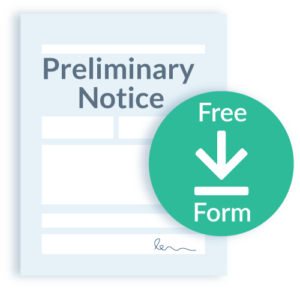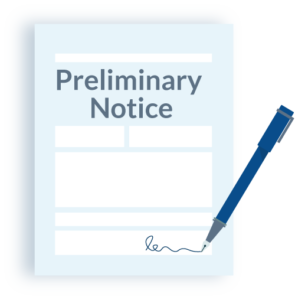Private projects
General contractors are not required to send a preliminary notice on private projects.
However, sending a preliminary notice on every project improves transparency on the job and could contribute to a speedy payment.
General contractors are not required to send a preliminary notice on private projects.
However, sending a preliminary notice on every project improves transparency on the job and could contribute to a speedy payment.
General contractors are not required to send a preliminary notice on public projects.
Subcontractors and suppliers are not required to send a preliminary notice in private projects.
However, sending a preliminary notice no matter the requirements is a good way to improve transparency and facilitate a speedier payment.
Subcontractors and suppliers are not required to send a preliminary notice on public projects.
Washington DC is a non-notice state. Therefore, there are no preliminary notice requirements.
N/A
N/A
N/A.
N/A
N/A
No. Washington DC does not require any preliminary notice to preserve the right to make a bond claim.
N/A
N/A
N/A
N/A
First, filing a lien under the circumstances you present is problematic. There are strict deadlines for noticing intent and recording your lien. Sounds to me like this is an afterthought and not within 4 months of your last date of work, but perhaps I'm wrong there. In any event, if you're seeking items from two years ago, I doubt that would go well for you under a mechanic's lien theory of recovery.
Second, it doesn't sound like there was much of an arrangement between you and the owner, this was something you were doing to improve the residence you were living in.
Third, if you're broke, what good is the mechanic's lien anyway? Even if it were valid, you'd still need to take action on it to pursue it. If they've just refi'd, I imagine the property is encumbered to a not-insignificant extent. The loan already closed, so presumably they aren't going to refi again or sell very soon. If you don't have the money to pursue a wrongful eviction, foreclosure likely isn't within your current financial ability to pursue. If you aren't going to foreclose, then you still have other claims and remedies, but I'd think you'd handle most of those claims and damages within a wrongful eviction case, should you ever have the means to pursue that case.
Most likely your best course of action at this point would be a demand letter and potentially a breach of contract action against the GC who has not paid you. If there is a payment bond on the project your may still have time to make a claim against this bond. But otherwise, because you did not send preliminary notice, you would not have lien rights.
It’s rare that a state has no preliminary notice requirements for any party on any project, but that’s the case in Washington DC (even though it’s not really a state).
While there may be no specific requirements to provide a preliminary notice in the District of Columbia, that doesn’t mean that providing some the of notice is a bad idea. In fact, providing preliminary notice, even when not required, is usually the smart thing to do. Providing a voluntary preliminary notice document, provided it’s drafted and formulated correctly, can be beneficial by promoting project visibility, providing helpful information, opening channels for communication, and streamlining payment.
The above are just some of the many reasons to provide voluntary preliminary notices, or as we like to call them at Levelset, “visibility documents” but, in fact, there are many more reasons, as well.

The generic notice form can be used in Washington DC along with any other state where preliminary notices aren’t required. It provides information about your company to the property owner, general contractor, and other parties in charge of payment on a construction project.

After you download the form, the next step is to fill the form out completely and accurately. Property owners and GCs often rely on this document to communicate with you, so mistakes on this form can cause payment delays.

Since preliminary notices aren’t required in Washington DC, there are no specific requirements for delivery. Deliver your notice however you see fit.
Select Preliminary Notice document.
Provide basic job information.
Levelset sends the document for you. Postage included!